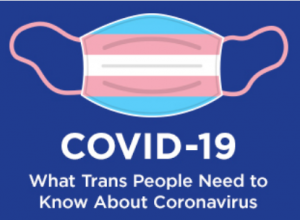 Research shows that patients with pre-existing conditions like diabetes, heart disease, lung disease, liver disease, and immunocompromised patients are at high risk for severe illness from Covid-19. LGBTQ people have higher rates of HIV infection and cancer, and therefore may have a compromised immune system. Transgender and gender non-binary persons are five times more likely to be living with HIV compared to the general population. National data shows that 30% of transgender people report harassment in medical settings and postpone medical care when sick or injured to avoid discrimination. LGBTQ people use tobacco at a rate of 50% higher than the general population. Covid-19 infection causes a respiratory illness that could be especially harmful to smokers.
Research shows that patients with pre-existing conditions like diabetes, heart disease, lung disease, liver disease, and immunocompromised patients are at high risk for severe illness from Covid-19. LGBTQ people have higher rates of HIV infection and cancer, and therefore may have a compromised immune system. Transgender and gender non-binary persons are five times more likely to be living with HIV compared to the general population. National data shows that 30% of transgender people report harassment in medical settings and postpone medical care when sick or injured to avoid discrimination. LGBTQ people use tobacco at a rate of 50% higher than the general population. Covid-19 infection causes a respiratory illness that could be especially harmful to smokers.
As part of a national triage strategy, the American College of Surgeons (ACS) recommended postponing non-essential surgeries. For example, repair of a groin hernia may be defined as elective, and the ACS advised postponing this kind of surgery. In organ transplantation, practices have varied depending on the type of patient and procedure. A recent report of international surgery showed that transplantation for acute liver failure was paused in 13 of 19 countries, including England, France, Germany and Japan. In contrast, elective living donor kidney transplantations were postponed or halted in 19 of 19 countries, including Australia, Canada, Switzerland, Spain, and four of the five U.S. centers surveyed.
Gender-affirming surgeries are planned, or “elective,” operations, and therefore many have been delayed because of the pandemic. We all want to ensure the health and safety of patients and healthcare workers, but we also want to understand the specific problems for LGBTQ patients in accessing healthcare. In urban areas, in rural areas and parts of the American South, intersections of sociological and geographic factors can make health & wellness hard to achieve. These include problems with rural or urban-sprawl, public transportation, internet access, telemedicine, and racial, ethnic and sexuality- or gender identity-based discrimination.
